
DDDBMT Phase I: Rhythm is the key (1965-1966)
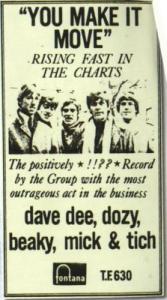 In late 1965 the Dozies finally found their way into the upper regions of the charts. Their third
single "You Make It Move" - a make-or-break-effort written by Howard & Blaikley
again went as high as #26 in the UK charts. What a Christmas present for the boys! It stayed for
8 weeks and made the public aware of the band.
In late 1965 the Dozies finally found their way into the upper regions of the charts. Their third
single "You Make It Move" - a make-or-break-effort written by Howard & Blaikley
again went as high as #26 in the UK charts. What a Christmas present for the boys! It stayed for
8 weeks and made the public aware of the band.
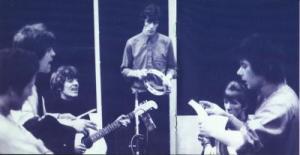 In its bubblegum-power-pop style it was the first of many singles devised mainly for dance ability
and wide appeal for radio. It heralded their first big phase of hit records. During this period the band
would record the songs on their own after they had tweaked and arranged the raw songs Howard
& Blaikley would give them.
In its bubblegum-power-pop style it was the first of many singles devised mainly for dance ability
and wide appeal for radio. It heralded their first big phase of hit records. During this period the band
would record the songs on their own after they had tweaked and arranged the raw songs Howard
& Blaikley would give them.
In March 1966, after a first package tour with Gene Pitney, they made it to the top with "Hold
Tight". The song stayed in the charts for four months, hitting #4 in UK and Germany and - being
played in all the big stadiums at that time - brings back memories of England winning the 1966 World Cup.
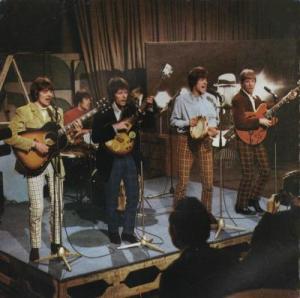 Together with Tich's trendy fuzz guitar it featured all trademarks of this first phase of DDDBMT songs:
strong beat, unpretentious, repetitive lyrics, clapping and a catchy hook.
Together with Tich's trendy fuzz guitar it featured all trademarks of this first phase of DDDBMT songs:
strong beat, unpretentious, repetitive lyrics, clapping and a catchy hook.
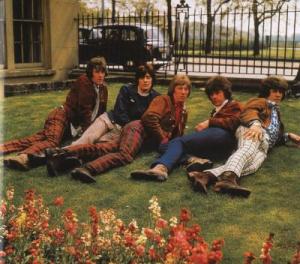 "Hideaway", their next single was basically of the same beat but more melodic. In June
1966 it went as high as #10 in UK and even to #2 in Germany. It was (actually twice) recorded in late
spring together with a bunch of songs that were released on their first album "Dave Dee, Dozy,
Beaky, Mick & Tich"
"Hideaway", their next single was basically of the same beat but more melodic. In June
1966 it went as high as #10 in UK and even to #2 in Germany. It was (actually twice) recorded in late
spring together with a bunch of songs that were released on their first album "Dave Dee, Dozy,
Beaky, Mick & Tich"
The album was a good balance of rocking but melodic pop. Apart from their hits it also contained the
beautiful ballad "Here's A Heart" - a song in which Dave usually calls a girl up on stage.
The band rarely sacrificed musical effects for comedy, but for the first song Kenny Everett introduces
the band in his inimitable style - capturing the confusion the name still brought (even up to today) to the DJs.
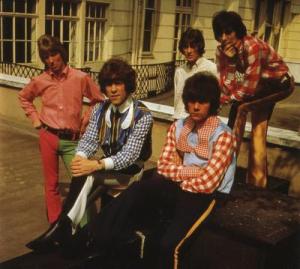 Naturally, the album also made the charts, for 10 weeks, and peaked at #11 in late summer. In the meantime
their records had already become bestsellers almost all over the world, the only market that did not seem to
open up to them was the USA.
Naturally, the album also made the charts, for 10 weeks, and peaked at #11 in late summer. In the meantime
their records had already become bestsellers almost all over the world, the only market that did not seem to
open up to them was the USA.
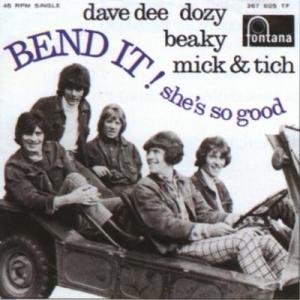 That changed though with the controversial single "Bend It" that was released in September.
Masterminds Howard & Blaikley knew about the risk of producing too many singles that would sound
alike so they started experimenting with shifts in instrumentation. For this song they choose some Greek
elements since that was the hype of the season - later it would be Latin percussions, a Russian balalaika
or African drums. The accelerating tempo of "Bend It" resulted mainly from experimenting with
the mandolin during rehearsals.
That changed though with the controversial single "Bend It" that was released in September.
Masterminds Howard & Blaikley knew about the risk of producing too many singles that would sound
alike so they started experimenting with shifts in instrumentation. For this song they choose some Greek
elements since that was the hype of the season - later it would be Latin percussions, a Russian balalaika
or African drums. The accelerating tempo of "Bend It" resulted mainly from experimenting with
the mandolin during rehearsals.
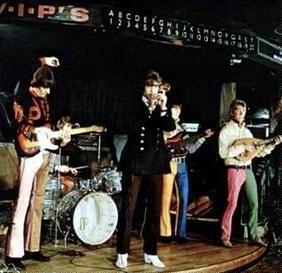 The song stormed the charts in no time. It teased the audience with its sped-up tempo and an offbeat
guitar break midway but mostly with its salacious lyrics! The heavy tongue-in-cheek suggestiveness arose
some moral outcries - but exactly that was probably the extra boost to shoot the single to #2 in UK in
September and even #1 in Germany! It was censored by many radio stations, especially in the USA -
the band even had to record a more innocently texted version for the US market - ostensibly a dance song
that at least made a first impression there.
The song stormed the charts in no time. It teased the audience with its sped-up tempo and an offbeat
guitar break midway but mostly with its salacious lyrics! The heavy tongue-in-cheek suggestiveness arose
some moral outcries - but exactly that was probably the extra boost to shoot the single to #2 in UK in
September and even #1 in Germany! It was censored by many radio stations, especially in the USA -
the band even had to record a more innocently texted version for the US market - ostensibly a dance song
that at least made a first impression there.
Actually the band did two new versions of the song - who dared to tell them that the song had a naughty
text and needed to be re-done? So when they went back into the studio they decided to give their record
company a jolt - they recorded two new texted versions - the one that made it on the official USA-release -
and a second, even naughtier version than the original - quite the opposite of what the producer had asked for!
They put the "naughty" version as first on the tape they had to give to Baverstock and put the
tape on his secretary's desk - Luckily Baverstock saw the joke ...
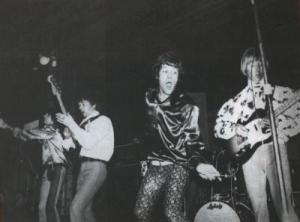 In autumn DDDBMT went on a major tour with the Troggs and Spencer Davis Group through various countries,
especially Germany - where they always had their most success: even their first two albums reached Top 5
there, and the singles success was greater than in the UK throughout the time.
In autumn DDDBMT went on a major tour with the Troggs and Spencer Davis Group through various countries,
especially Germany - where they always had their most success: even their first two albums reached Top 5
there, and the singles success was greater than in the UK throughout the time.
During the tour some of their comic capers had to be dropped in the face of the predominantly
young, screaming female audiences and also their earthy language onstage was moderated after
criticism in the "New Musical Express", but nevertheless they still were one of the most
popular live bands.
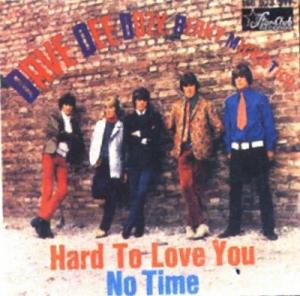 The next single released in Holland and Germany was "It's So Hard To Love You" - a more
conventional beat taken from the first album. It went to #10 in Germany in November. A good example
of how different the countries handled their releases. Sometimes they would even put different B-Sides
on them - most of the originally released flipsides were group collaborations - mainly written by Dozy, Beaky
and Dave. They were usually knocked off at the end of recording sessions, but produced their share
of startling moments like Tich's Hendrix touch on "Shame" or the psychedelics and tape
editing on "The Sun Goes Down". These songs often did not turn up on their studio albums,
but then not even all single hits were on them - "Save Me", "Touch Me, Touch Me"
or "Okay" only turned up on various compilations later on.
The next single released in Holland and Germany was "It's So Hard To Love You" - a more
conventional beat taken from the first album. It went to #10 in Germany in November. A good example
of how different the countries handled their releases. Sometimes they would even put different B-Sides
on them - most of the originally released flipsides were group collaborations - mainly written by Dozy, Beaky
and Dave. They were usually knocked off at the end of recording sessions, but produced their share
of startling moments like Tich's Hendrix touch on "Shame" or the psychedelics and tape
editing on "The Sun Goes Down". These songs often did not turn up on their studio albums,
but then not even all single hits were on them - "Save Me", "Touch Me, Touch Me"
or "Okay" only turned up on various compilations later on.
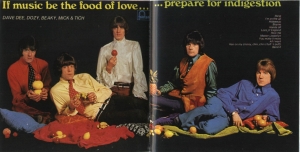 November saw the release of their second album - well fitting for a band with their name it surely has
one of the longest names itself: "If Music Be The Food of Love Then Prepare For Indigestion".
Like their first album it included some fine group compositions and showcased the individual talents of the
group members by allowing the others to take a lead vocal again: Beaky on "Help Me" and Dozy
on "Hands Off".
November saw the release of their second album - well fitting for a band with their name it surely has
one of the longest names itself: "If Music Be The Food of Love Then Prepare For Indigestion".
Like their first album it included some fine group compositions and showcased the individual talents of the
group members by allowing the others to take a lead vocal again: Beaky on "Help Me" and Dozy
on "Hands Off".
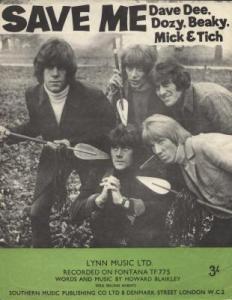 Shortly before Christmas 1966 their percussion party "Save Me" followed in the footsteps of
all the other chart hits: #4 in UK. Producer Steve Rowland had been inspired by his affinity for Latin rhythms
and the boys did a great job to make it most interesting with their voices, especially on some live performances.
Shortly before Christmas 1966 their percussion party "Save Me" followed in the footsteps of
all the other chart hits: #4 in UK. Producer Steve Rowland had been inspired by his affinity for Latin rhythms
and the boys did a great job to make it most interesting with their voices, especially on some live performances.
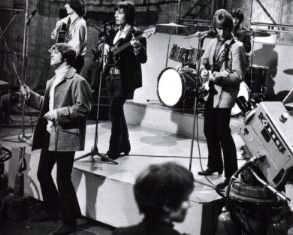 Everything looked fine. They toured through Australia, New Zealand, Singapore and Hong Kong - along with
Eric Burdon's Animals - they were perennial favourites on BBC's Top of the Pops and German Beat Club and in
March 1967 German Youth magazine Bravo awarded them with the Golden Otto - the readers had voted
them for the most popular band, even beating the big names like the Kinks (8), Rolling Stones (5) and the Beatles (2)!
Everything looked fine. They toured through Australia, New Zealand, Singapore and Hong Kong - along with
Eric Burdon's Animals - they were perennial favourites on BBC's Top of the Pops and German Beat Club and in
March 1967 German Youth magazine Bravo awarded them with the Golden Otto - the readers had voted
them for the most popular band, even beating the big names like the Kinks (8), Rolling Stones (5) and the Beatles (2)!
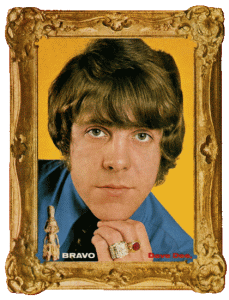 These four back-to-back top hits firmly entrenched the boys in the fast lane of fame and success - What could
go wrong? Well, their next single, another conventional beat, fell short of their expectations. "Touch Me
Touch Me" did not make it into the top ten and Howard & Blaikley immediately became aware of
the fast movement in the pop business again.
These four back-to-back top hits firmly entrenched the boys in the fast lane of fame and success - What could
go wrong? Well, their next single, another conventional beat, fell short of their expectations. "Touch Me
Touch Me" did not make it into the top ten and Howard & Blaikley immediately became aware of
the fast movement in the pop business again.
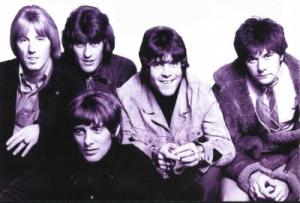 They realized that their previously successful beat-driven style was worn out. They had to come up with new
ideas, change the whole sound of the band. So after a mere instrumental change for "Okay" they
plunged into a completely new kind of melodramatic songs.
They realized that their previously successful beat-driven style was worn out. They had to come up with new
ideas, change the whole sound of the band. So after a mere instrumental change for "Okay" they
plunged into a completely new kind of melodramatic songs.
or jump to...

[Last update
of this page: 30-Apr-07]











 Shortly before Christmas 1966 their percussion party "Save Me" followed in the footsteps of
all the other chart hits: #4 in UK. Producer Steve Rowland had been inspired by his affinity for Latin rhythms
and the boys did a great job to make it most interesting with their voices, especially on some live performances.
Shortly before Christmas 1966 their percussion party "Save Me" followed in the footsteps of
all the other chart hits: #4 in UK. Producer Steve Rowland had been inspired by his affinity for Latin rhythms
and the boys did a great job to make it most interesting with their voices, especially on some live performances. Everything looked fine. They toured through Australia, New Zealand, Singapore and Hong Kong - along with
Eric Burdon's Animals - they were perennial favourites on BBC's Top of the Pops and German Beat Club and in
March 1967 German Youth magazine Bravo awarded them with the Golden Otto - the readers had voted
them for the most popular band, even beating the big names like the Kinks (8), Rolling Stones (5) and the Beatles (2)!
Everything looked fine. They toured through Australia, New Zealand, Singapore and Hong Kong - along with
Eric Burdon's Animals - they were perennial favourites on BBC's Top of the Pops and German Beat Club and in
March 1967 German Youth magazine Bravo awarded them with the Golden Otto - the readers had voted
them for the most popular band, even beating the big names like the Kinks (8), Rolling Stones (5) and the Beatles (2)!
 These four back-to-back top hits firmly entrenched the boys in the fast lane of fame and success - What could
go wrong? Well, their next single, another conventional beat, fell short of their expectations. "Touch Me
Touch Me" did not make it into the top ten and Howard & Blaikley immediately became aware of
the fast movement in the pop business again.
These four back-to-back top hits firmly entrenched the boys in the fast lane of fame and success - What could
go wrong? Well, their next single, another conventional beat, fell short of their expectations. "Touch Me
Touch Me" did not make it into the top ten and Howard & Blaikley immediately became aware of
the fast movement in the pop business again.
